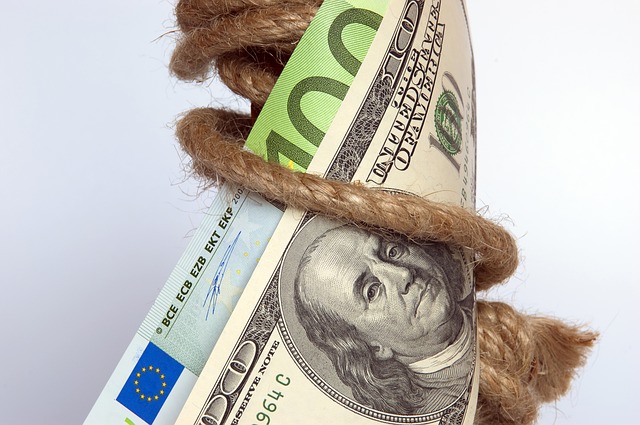
Economic systems are pervasive and consuming. Entrenchment in the economy of your world/ nation/state will impact your worldview. Like yeast in bread, it will also invade and shape your faith. Debt is a horrible burden to bear, yet once free from it, the temptation to come under its mastery again can be overwhelming.
No wonder after Jesus prayed, “forgive us our debts” He straightaway moved into “lead us not into temptation.”
Jesus talked about money often, and conditioned separation from its Lordship for those who would enter the Kingdom of God and receive a new revelation concerning true value. His call was without excuses or exemptions, discipleship demanded leaving ashore those fishing nets and turning from your tax table.
Economy language fills the pages of the Bible. Theology of merit and demerit, redemption, loss and gain, purchase, performance and reward are central in both old and new covenant theology.
Not hard to understand why then the economy you serve will affect your theology and faith, as your reference for biblical language will derive from the present economy you serve.
This, I believe is exactly why a drastic separation must be made from lives of servitude to - 'inherited monetary' and 'theological traditions' before entrance can be granted into the kingdom of God that Jesus proclaimed (I am not talking about salvation here, but real discipleship, participation and revelation in Jesus' mandate).
Whether the chicken came before the egg or vice versa, theology and economy have been family for a long, long time. It is for this reason Jesus made statements like:
“How hard it is for a rich man To enter the kingdom of God” or “it’s easier for heaven and earth to pass away, than for on jot or tittle of the law to fail”.
The old order doesn’t let go easily, and kingdom entrance can often be a violent experience.
No nice metaphors
That Jesus wasn’t throwing around nice metaphors or vain allegories is proved by the demand he placed on the rich young ruler, as in “sell everything”.
I imagine Jesus reasoning with him as something along the lines of: “Okay you’ve done pretty well in the fading old currency, so take it all the way, give everything to the poor, fill up your merit, then come follow me, you may start out with nothing but this new economy I’m starting will give you riches you never imagined!” - the young ruler, intoxicated with his present success, couldn’t make the investment, and missed out on being a shareholder in the throne of God.
My guess is that by 70 AD many upper class Jews who profited from the economic advantages of their religious views and lifestyles suddenly found all the riches they had stored for themselves and their descendants suddenly vanish away.
The destruction of their temple and city, central to their worship, theology and economic advantage, would have left them completely destitute. The event would have destroyed their prosperity and success gospel in one shattering blow. Indifference to the poor and intolerance of the gentiles would not allow an easy recovery.
This, I believe, is the group the Apostle James knew and targeted with prophetic accuracy in chapter 5 of his epistle.
On the other hand, many of the mostly poor disciples of Jesus, who the rich and religious rulers once scoffed at, by spreading a message of debt cancellation to the unrighteous, upon fleeing Jerusalem would find themselves welcomed into everlasting homes. (See Luke chapter 16.)
My conclusion is this, without deliverance from the love of and servitude of money, our kingdom theology will be faulty.
The degeneration of the kingdom message, into another prosperity gospel in recent years is proof of this. People with multiple titles and preachers with extra business prowess are seen as more ‘kingdom’ than others. Disciples with money are seen as more beneficial to ‘kingdom advancement’ than those that are poor. Certainly no one is asking the rich to give all their money away for the revelation they have…unless, of course, they give it to them.
Is it possible to define and know the value system of God’s Kingdom without deliverance from the mastery of Mammon? Are churches preaching from the Law of Moses because it grants conditions for economic blessing and promise, rather than expounding the kingdoms perpetual Jubilee in Jesus Christ?
Does our faith rise and fall depending upon our economic position, or are we anchored into an unfading everlasting inheritance? Will disaster be our deliverance, or will we be delivered from disaster?
These are some questions, in my view, for those who believe the kingdom is near.

Joshua Robbie is currently serving the Lord under Pastors Ronnie and Shirley Naidoo of KZN Celebration Centre in Tongaat South Africa. He and His wife Rene’ moved from Australia to South Africa in April 2016. Their desire is to help in whatever way they can so that the church can become all that God has purposed her to be. Josh also enjoys sports such as surfing, basketball and boxing.
Josh Robbie's previous articles may be viewed at
http://www.pressserviceinternational.org/josh-robbie.html

Joshua Robbie is currently serving the Lord under Pastors Ronnie and Shirley Naidoo of KZN Celebration Centre in Tongaat South Africa. He and His wife Rene’ moved from Australia to South Africa in April 2016. Their desire is to help in whatever way they can so that the church can become all that God has purposed her to be. Josh is a painter by trade and also enjoys sports such as surfing, basketball and boxing. He has also written a book, now available for purchase on Amazon called: “Your Father sees: Living the sermon on the mount”.Josh Robbie previous articles may be viewed http://www.pressserviceinternational.org/josh-robbie.html